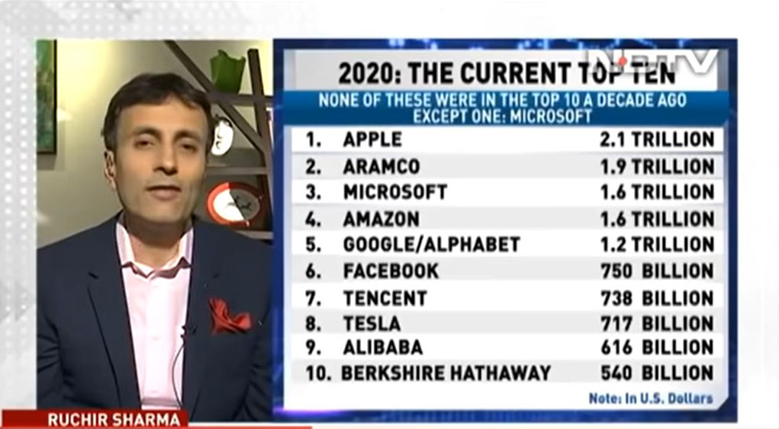Even though the digital revolution will continue to spread, and in spite of the incredible growth that tech giants Google, Facebook, Amazon, and Apple have experienced over the past decade, Ruchir Sharma foresees major headwinds for big tech in the years ahead. Using history as an indicator, the Morgan Stanley fund manager predicts that most of tech’s large incumbents will significantly underperform growth projections for the 2020s. According to Sharma, the best companies of one decade, tend to perform poorly in exactly the following decade.

Ruchir Sharma – an Indian investor and fund manager who has written widely on global economics and politics, Ruchir is Head of Emerging Markets and Chief Global Strategist at Morgan Stanley Investment Management.
History Tends To Repeat
If we look at the top tech companies in 2020, there is a pretty broad consensus that the incumbents will continue to lead technological innovation going forward. Problem is, this isn’t how history tends to play out. It would be an anomaly if all but a few of today’s tech giants maintain their growth rate and stay at the top of the pack. If you go back a decade, for example, only one of the incumbents has remained on the leader board – Microsoft. Other tech names like Google, Facebook, Apple and Amazon – they were the up-and-comers. They were still coming of age, in the days of rapid user adoption and high growth. Former tech leaders on the other hand – companies like IBM, Cisco, Oracle, Hewlett-Packard, and Intel – experienced much slower growth. And while they’re still around, most are now significantly smaller relative to the aforementioned tech giants that overtook them. So don’t be so certain, says Sharma, that history won’t repeat itself once again.

Tech Giants Sow The Seeds Of Their Own Demise
Why do the industry leaders generally stumble – particularly the tech giants? Sharma believes its because they sow the seeds of their own demise. Its the law of creative destruction. While many of the incumbents are seen to be strong and vibrant today, very few of them tend to do well after they become too big. Although they were once very nimble, they become so large and centralized that they’re no longer able to cater to rapidly evolving tastes. And in the 21st century, where consumer habits are changing so rapidly (particularly in tech), smaller, localized brands have a competitive advantage over their larger competitors.
Betting On Smaller, More Nimble Companies
Keeping history in mind, Sharma says he would be leery about putting capital to work in any of today’s top 10 tech incumbents. He foresees a much different landscape a decade into the future. He believes that, in the next 5 to 10 years, big tech’s growth rates are bound to slow down and even disappoint. “Over the next five to ten years, if I were a betting person, I would say that these [tech] companies will fade rather than grow rapidly from here.”
In light of the ever increasing pace of innovation, risk of regulatory pressures, and new challenges that are more local in nature, Sharma prefers the prospects of smaller tech companies. Not only are they more nimble, but they’re better able to cater to localized markets.
While Ruchir Sharma doesn’t give any specific company names – winners vs. losers in the tech industry over the next decade – its a fun thought experiment to surmise based on his outlook and reasoning. So which of the big tech giants might slip from the top of the podium, and what are a few names that might rise to join the leaders a decade into the future? The following – by no means investment advice – is our list of the big tech incumbents facing slower growth vs. exciting up-and-comers…
Big Tech Incumbents (slower growth)
Up-And-Comers (faster growth)






